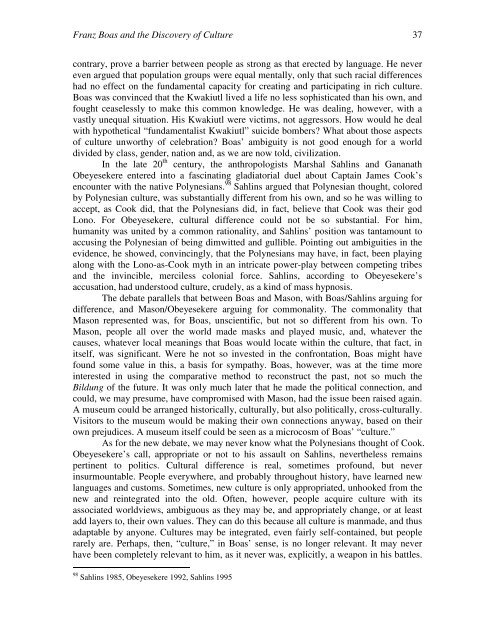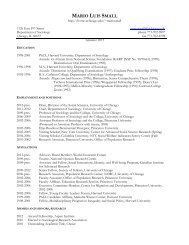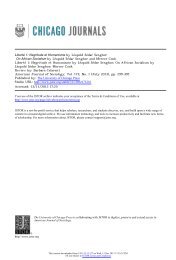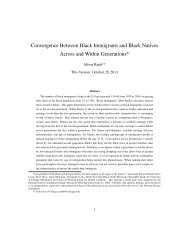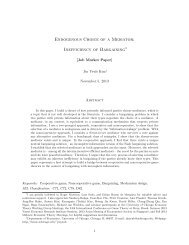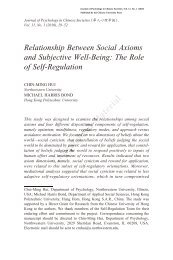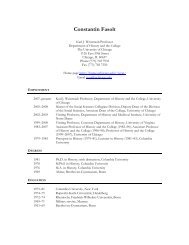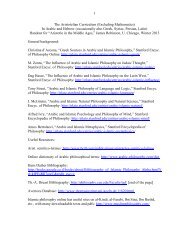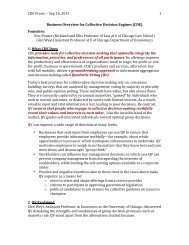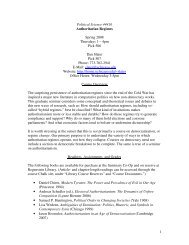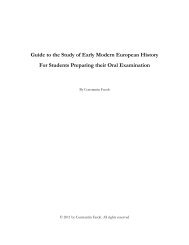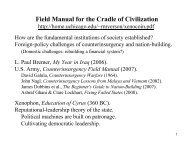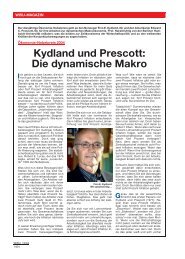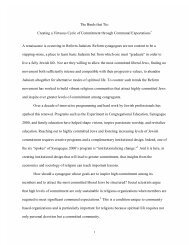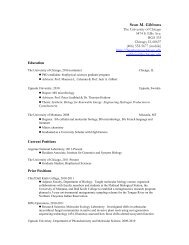Franz Boas and the Discovery of Culture - Personal Web Pages ...
Franz Boas and the Discovery of Culture - Personal Web Pages ...
Franz Boas and the Discovery of Culture - Personal Web Pages ...
You also want an ePaper? Increase the reach of your titles
YUMPU automatically turns print PDFs into web optimized ePapers that Google loves.
<strong>Franz</strong> <strong>Boas</strong> <strong>and</strong> <strong>the</strong> <strong>Discovery</strong> <strong>of</strong> <strong>Culture</strong> 37<br />
contrary, prove a barrier between people as strong as that erected by language. He never<br />
even argued that population groups were equal mentally, only that such racial differences<br />
had no effect on <strong>the</strong> fundamental capacity for creating <strong>and</strong> participating in rich culture.<br />
<strong>Boas</strong> was convinced that <strong>the</strong> Kwakiutl lived a life no less sophisticated than his own, <strong>and</strong><br />
fought ceaselessly to make this common knowledge. He was dealing, however, with a<br />
vastly unequal situation. His Kwakiutl were victims, not aggressors. How would he deal<br />
with hypo<strong>the</strong>tical “fundamentalist Kwakiutl” suicide bombers? What about those aspects<br />
<strong>of</strong> culture unworthy <strong>of</strong> celebration? <strong>Boas</strong>’ ambiguity is not good enough for a world<br />
divided by class, gender, nation <strong>and</strong>, as we are now told, civilization.<br />
In <strong>the</strong> late 20 th century, <strong>the</strong> anthropologists Marshal Sahlins <strong>and</strong> Gananath<br />
Obeyesekere entered into a fascinating gladiatorial duel about Captain James Cook’s<br />
encounter with <strong>the</strong> native Polynesians. 98 Sahlins argued that Polynesian thought, colored<br />
by Polynesian culture, was substantially different from his own, <strong>and</strong> so he was willing to<br />
accept, as Cook did, that <strong>the</strong> Polynesians did, in fact, believe that Cook was <strong>the</strong>ir god<br />
Lono. For Obeyesekere, cultural difference could not be so substantial. For him,<br />
humanity was united by a common rationality, <strong>and</strong> Sahlins’ position was tantamount to<br />
accusing <strong>the</strong> Polynesian <strong>of</strong> being dimwitted <strong>and</strong> gullible. Pointing out ambiguities in <strong>the</strong><br />
evidence, he showed, convincingly, that <strong>the</strong> Polynesians may have, in fact, been playing<br />
along with <strong>the</strong> Lono-as-Cook myth in an intricate power-play between competing tribes<br />
<strong>and</strong> <strong>the</strong> invincible, merciless colonial force. Sahlins, according to Obeyesekere’s<br />
accusation, had understood culture, crudely, as a kind <strong>of</strong> mass hypnosis.<br />
The debate parallels that between <strong>Boas</strong> <strong>and</strong> Mason, with <strong>Boas</strong>/Sahlins arguing for<br />
difference, <strong>and</strong> Mason/Obeyesekere arguing for commonality. The commonality that<br />
Mason represented was, for <strong>Boas</strong>, unscientific, but not so different from his own. To<br />
Mason, people all over <strong>the</strong> world made masks <strong>and</strong> played music, <strong>and</strong>, whatever <strong>the</strong><br />
causes, whatever local meanings that <strong>Boas</strong> would locate within <strong>the</strong> culture, that fact, in<br />
itself, was significant. Were he not so invested in <strong>the</strong> confrontation, <strong>Boas</strong> might have<br />
found some value in this, a basis for sympathy. <strong>Boas</strong>, however, was at <strong>the</strong> time more<br />
interested in using <strong>the</strong> comparative method to reconstruct <strong>the</strong> past, not so much <strong>the</strong><br />
Bildung <strong>of</strong> <strong>the</strong> future. It was only much later that he made <strong>the</strong> political connection, <strong>and</strong><br />
could, we may presume, have compromised with Mason, had <strong>the</strong> issue been raised again.<br />
A museum could be arranged historically, culturally, but also politically, cross-culturally.<br />
Visitors to <strong>the</strong> museum would be making <strong>the</strong>ir own connections anyway, based on <strong>the</strong>ir<br />
own prejudices. A museum itself could be seen as a microcosm <strong>of</strong> <strong>Boas</strong>’ “culture.”<br />
As for <strong>the</strong> new debate, we may never know what <strong>the</strong> Polynesians thought <strong>of</strong> Cook.<br />
Obeyesekere’s call, appropriate or not to his assault on Sahlins, never<strong>the</strong>less remains<br />
pertinent to politics. Cultural difference is real, sometimes pr<strong>of</strong>ound, but never<br />
insurmountable. People everywhere, <strong>and</strong> probably throughout history, have learned new<br />
languages <strong>and</strong> customs. Sometimes, new culture is only appropriated, unhooked from <strong>the</strong><br />
new <strong>and</strong> reintegrated into <strong>the</strong> old. Often, however, people acquire culture with its<br />
associated worldviews, ambiguous as <strong>the</strong>y may be, <strong>and</strong> appropriately change, or at least<br />
add layers to, <strong>the</strong>ir own values. They can do this because all culture is manmade, <strong>and</strong> thus<br />
adaptable by anyone. <strong>Culture</strong>s may be integrated, even fairly self-contained, but people<br />
rarely are. Perhaps, <strong>the</strong>n, “culture,” in <strong>Boas</strong>’ sense, is no longer relevant. It may never<br />
have been completely relevant to him, as it never was, explicitly, a weapon in his battles.<br />
98 Sahlins 1985, Obeyesekere 1992, Sahlins 1995


